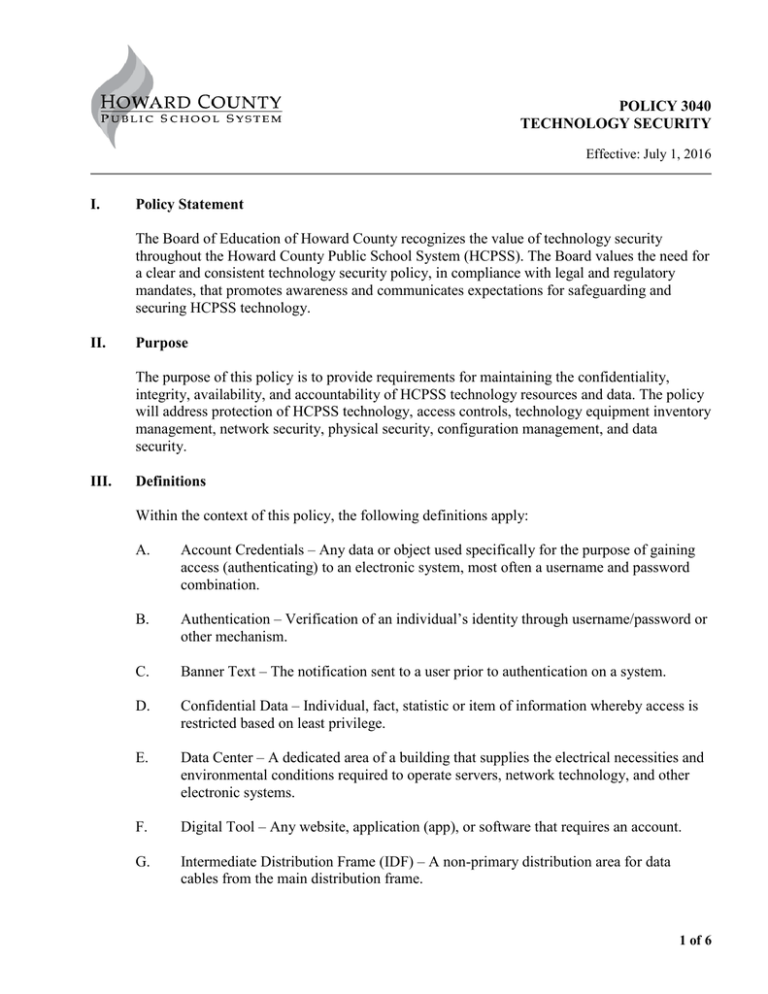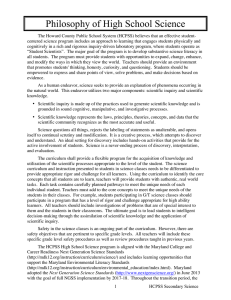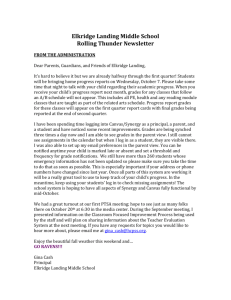Policy 3040: Technology Security
advertisement

POLICY 3040 TECHNOLOGY SECURITY BOARD OF EDUCATION Effective: July 1, 2016 I. Policy Statement The Board of Education of Howard County recognizes the value of technology security throughout the Howard County Public School System (HCPSS). The Board values the need for a clear and consistent technology security policy, in compliance with legal and regulatory mandates, that promotes awareness and communicates expectations for safeguarding and securing HCPSS technology. II. Purpose The purpose of this policy is to provide requirements for maintaining the confidentiality, integrity, availability, and accountability of HCPSS technology resources and data. The policy will address protection of HCPSS technology, access controls, technology equipment inventory management, network security, physical security, configuration management, and data security. III. Definitions Within the context of this policy, the following definitions apply: A. Account Credentials – Any data or object used specifically for the purpose of gaining access (authenticating) to an electronic system, most often a username and password combination. B. Authentication – Verification of an individual’s identity through username/password or other mechanism. C. Banner Text – The notification sent to a user prior to authentication on a system. D. Confidential Data – Individual, fact, statistic or item of information whereby access is restricted based on least privilege. E. Data Center – A dedicated area of a building that supplies the electrical necessities and environmental conditions required to operate servers, network technology, and other electronic systems. F. Digital Tool – Any website, application (app), or software that requires an account. G. Intermediate Distribution Frame (IDF) – A non-primary distribution area for data cables from the main distribution frame. 1 of 6 POLICY 3040 IV. H. Least Privilege – The methodology whereby each user is assigned only the appropriate level of access needed for their responsibilities. I. Main Distribution Frame (MDF) – The primary distribution area for connecting HCPSS equipment to subscriber carrier equipment. J. Network – The means of transmitting data between systems; includes wired and wireless technologies. K. Online Resource – Any website, application (app), or software that does not require an account. L. Technology – Electronic devices, network infrastructure, or any applications including but not limited to software, online resources, digital tools, social media, and email. Standards A. Protection of HCPSS Technology 1. The HCPSS reserves the right to take all necessary legal action to protect the confidentiality, integrity, availability, and accountability of its technology. 2. The HCPSS reserves the right to take all necessary legal action to prevent its technology from being used to attack, damage, harm, or exploit others. 3. Use of HCPSS technology to gain or attempt to gain unauthorized access to any system or information is prohibited. 4. The HCPSS reserves the right, in accordance with legal and regulatory mandates, to monitor, archive, audit, or purge the contents of electronic communications, files, and other material created or stored using HCPSS technology, or data transmitted over HCPSS networks. 5. The HCPSS reserves the right, in accordance with legal and regulatory mandates and as authorized by the Superintendent/Designee, to access or disclose, for investigative purposes, the contents of electronic communications, files, and other material created or stored using HCPSS technology or data transmitted over HCPSS networks. 6. Failure by any individual using HCPSS technology to comply with this policy will result in the temporary or permanent restriction of technology access privileges, in addition to any applicable disciplinary actions or financial obligations. 2 of 6 POLICY 3040 7. B. C. D. The HCPSS will maintain technology security incident response procedures in support of this policy and regulatory mandates including Maryland breach notification requirements. Access Controls 1. Individuals using HCPSS technology will authenticate using individual account credentials. Exceptions will be approved by the Superintendent/Designee and documented. 2. Individuals are prohibited from sharing HCPSS-assigned account credentials unless permitted, in writing, by the Superintendent/Designee. 3. Individuals are granted access to HCPSS data and resources based on a least privilege methodology. 4. Access to HCPSS technology, granted by virtue of the individual’s role, will be terminated when the individual’s role is fulfilled or terminated. Technology Equipment Accountability 1. All HCPSS technology equipment will be accounted for and tracked by location and functionality in an automated system before distribution. 2. HCPSS technology equipment will be audited periodically to ensure consistency and accuracy of the automated inventory system. 3. All HCPSS technology equipment must be disposed of in accordance with the National Institute of Standards and Technology (NIST) published standards. Network Security 1. All HCPSS technology networks will be designated as open or restricted. a. Restricted HCPSS technology networks will be configured to protect against unauthorized access. b. Individuals are prohibited from connecting non-HCPSS technology to restricted HCPSS networks without prior written approval from the Superintendent/Designee. Individuals may connect non-HCPSS technology to open wireless HCPSS technology networks in accordance with Policy 8080 Responsible Use of Technology and Social Media. c. 3 of 6 POLICY 3040 2. E. F. G. V. The HCPSS will employ banner text, where practical, to provide notice of legal rights and responsibilities to individuals using HCPSS technology. Physical Security 1. Physical access to data centers, main distribution frames (MDFs), and intermediate distribution frames (IDFs) will be controlled to prevent and detect unauthorized access to these areas. Access to these areas will be granted to those persons who have legitimate responsibilities in those areas. 2. All data centers will be secured using technologies that monitor individual access and provide auditable access logs. 3. Individuals responsible for HCPSS technology must take reasonable steps to ensure the physical security of HCPSS technology. Configuration Management 1. HCPSS technology systems will be evaluated for appropriate security controls and approved by the Superintendent/Designee. 2. HCPSS technology systems will be monitored to confirm configuration and to determine the effectiveness of security controls. 3. Changes to HCPSS technology systems will be evaluated, approved, and documented by the Superintendent/Designee. Methods for transmitting and storing student education records, personnel records, or confidential data electronically will be reviewed and approved by the Superintendent/Designee. Responsibilities A. The Superintendent/Designee will maintain guidelines for secure configuration of HCPSS technology. B. The Superintendent/Designee will maintain a process for creating, managing, and documenting account credentials. C. The Superintendent/Designee will inform HCPSS technology users regarding the provisions of this policy at least annually. D. The Superintendent/Designee will review this policy at least every three years and recommend it for revision as necessary. 4 of 6 POLICY 3040 VI. Delegation of Authority The Superintendent is authorized to develop procedures for the implementation of this policy. VII. References A. Legal Electronic Communications Privacy Act/Stored Communications Act, 18 U.S.C. §2701-27112 Family Educational Rights and Privacy Act (FERPA), 20 U.S.C. §1232(g) Title XVII, Children’s Internet Protection Act, 47 U.S.C. §254(h) and (l) Maryland Personal Information Protection Act, Md. Code Com. Law §§ 14-3501 et seq. Protection of Information by Government Agencies Md.,State Govt. Code §§ 10-1301 to 10-1308 The Annotated Code of Maryland, Education Article, §4-131, Student Data Privacy Act of 2015 B. Other Board Policies Policy 2070 Ethics Policy 4040 Fixed Assets Policy 7010 Personnel Records Policy 7030 Employee Conduct and Discipline Policy 8080 Responsible Use of Technology and Social Media Policy 8120 Testing: State and Local Responsibilities and Protocols Policy 9020 Students’ Rights and Responsibilities Policy 9030 School-Sponsored Publications and Productions Policy 9050 Student Records Policy 9200 Student Discipline Policy 10010 Distribution and Display of Materials and Announcements Policy 10020 Use of School Facilities C. Relevant Data Sources Central Inventory Database Help Desk Database Information Technology Audit Logs D. Other Data Center Access Procedures HCPSS Device Agreement Form HCPSS Student Code of Conduct Information Technology Change Management Guideline National Institute of Standards and Technology (NIST) Special Publication 800-88 Request for Computer User Account Form Technology Security Incident Handling Form 5 of 6 POLICY 3040 The State of Maryland (SOM) Information Security Policy, Version 3.1 Issued February 2013 The State of Maryland Information Technology (IT) Disaster Recovery Guidelines, Version 4.0 Issued July 2006 VIII. History ADOPTED: March 11, 2010 REVIEWED: MODIFIED: REVISED: May 9, 2013 June 9, 2016 EFFECTIVE: July 1, 2016 6 of 6 POLICY 3040-IP IMPLEMENTATION PROCEDURES TECHNOLOGY SECURITY Effective: July 1, 2016 I. Dissemination of Information A. Notification of the provisions of this policy and these implementation procedures will be given annually, and as otherwise required, to all students, families, employees, and service providers. Methods may include: 1. Publications in school and Howard County Public School System (HCPSS) newsletters, handbooks, and other documents. 2. Notifications posted in areas that provide access to technology (e.g., media center, computer lab, classrooms, and staff workroom). 3. Notifications posted on school and HCPSS websites, including but not limited to, the learning management system and the staff communication tool. 4. Ongoing notification/reviews for students by classroom teachers, media specialists, or other appropriate employees. 5. Inclusion, whenever possible and appropriate, into the process of accessing digital tools and/or files. 6. Periodic announcements in schools over the public address system at the beginning of the school year and at other times as appropriate. B. Principals are responsible for notifying all students, families, employees, volunteers, contractors, and interns in their schools of the responsibilities of use of HCPSS technology at the beginning of the school year, with reminders as necessary. C. Department supervisors are responsible for notifying those under their supervision of the provisions of this policy and these implementation procedures. D. The Use of School Facilities Office is responsible for notifying individuals or organizations seeking to use HCPSS technology as part of an agreement to use school system facilities (Policy 10020 Use of School Facilities) of the provisions of this policy and these implementation procedures. E. The Office of Safety, Environment, and Risk Management in collaboration with the Technology Department and the Division of Accountability is responsible for 1 of 7 POLICY 3040-IP IMPLEMENTATION PROCEDURES providing annual Data Privacy and Security Awareness Training for all staff members. F. II. Security notifications and advisory information will be published for relevant audiences through various media including but not limited the learning management system, the staff communication tool, and HCPSS websites. General Procedures A. B. C. D. Electronic Communications 1. Individuals will have no expectation of personal privacy or confidentiality of any electronic communication when using HCPSS technology. 2. HCPSS technologies that store or transmit employee data, student record data, financial data, or other legally confidential data will implement appropriate authentication and encryption technologies to prevent unauthorized access or modification. 3. Individuals using HCPSS technology will ensure that both their usage and electronic communications content are in compliance with all other HCPSS policies. Online Testing 1. For security purposes, all online testing will be conducted in accordance with the state, local, and vendor-specific guidelines, policies, and procedures. 2. All data saved to computers and servers for online testing administration and execution will be deleted in accordance with the state, local, and vendorspecific guidelines, policies, and procedures. Security Vulnerability Assessments 1. The Superintendent/Designee will coordinate annual technology security vulnerability assessments consistent with industry best practices and in compliance with regulatory mandates. 2. The HCPSS may contract with third party companies or individuals to perform external security vulnerability assessments and penetration tests. Technology Security Incident Response 1. All HCPSS technology security investigations will be authorized by the Superintendent/Designee. 2. The HCPSS will monitor HCPSS technology for potential security incidents. 2 of 7 POLICY 3040-IP IMPLEMENTATION PROCEDURES E. 3. The HCPSS reserves the right to access, record or, if necessary, remove content stored in an individual’s assigned account on HCPSS technology with prior written approval from the Superintendent. 4. The HCPSS reserves the right to restrict or remove any device suspected of contributing to a security incident. 5. The Superintendent/Designee will document all HCPSS technology security investigations using the HCPSS Technology Security Incident Handling Form. 6. The Superintendent/Designee will conduct all HCPSS technology security incident investigations in strict confidence. 7. Investigations into incidents involving a potential breach of an individual's private data will include the following: a. Notifications to individuals will be required if it is determined that an individual’s personal information has been breached and misuse has occurred or is likely to occur. b. If 1,000 or more individuals are involved in a breach notification, the HCPSS will also notify each consumer reporting agency as defined by 15 U.S.C. § 1681a(p), of the timing, distribution, and content of the notices. c. If misuse is not likely to occur, as in cases where the information breached was protected by encryption and there is no evidence the encryption key had been compromised or disclosed, notifications to individuals will not be required. d. The HCPSS will maintain records on determinations for data breach notifications for three years after the determination has been made. Storage Media Handling and Disposal 1. Access to HCPSS storage media including, but not limited to, floppy disks, magnetic tapes, hard disks, CDs, DVDs, USB memory sticks, etc., will be secured utilizing the least privileges methodology. 2. All service to HCPSS computers and servers will be performed onsite by authorized HCPSS personnel or authorized contractors. If a computer or server must be taken offsite for service, all hard drives, CDs, and DVDs will be removed prior to the equipment leaving the premises. If removal of any/all hard disks, CDs, or DVDs is not feasible, prior approval will be obtained in writing by the Superintendent/Designee to remove the equipment. 3 of 7 POLICY 3040-IP IMPLEMENTATION PROCEDURES 3. F. G. All HCPSS storage media including, but not limited to, floppy disks, hard disks, CDs, DVDs, USB memory sticks, etc., will be disposed of in accordance with the National Institute of Standards and Technology (NIST) Special Publication 800-88. Systems Development Life Cycle 1. All HCPSS applications and systems will be developed or procured in compliance with all legal regulatory mandates. 2. When feasible, all HCPSS systems and applications will employ the latest software versions and patch levels to ensure maximum functionality and security. 3. All HCPSS application training data will not include confidential information. 4. All HCPSS application and system source code will be managed in a controlled, auditable environment. 5. Changes to HCPSS technology will be evaluated, approved, and documented in accordance with the Information Technology Change Management Guideline. 6. Systems will be designated as either critical or non-critical. 7. Disaster Recovery procedures will be maintained and tested for all critical systems. System Security 1. The HCPSS will employ technology security measures, including monitoring, to ensure the confidentiality, integrity, availability, and accountability of its technology and data. 2. Open wireless networks will be configured to notify users of network monitoring capabilities and the provisions of HCPSS Policy 8080 Responsible Use of Technology and Social Media. 3. All publicly accessible systems will be located in a separate dedicated network segment configured to restrict access to internal trusted networks. 4. Publicly accessible critical systems will be monitored by an automated vulnerability assessment system at least weekly to confirm configuration and determine the effectiveness of implemented security controls. 4 of 7 POLICY 3040-IP IMPLEMENTATION PROCEDURES 5. Critical systems will maintain audit logs to track user activity and actions that are administratively prohibited. Audit logs will be reviewed at least daily. 6. Individuals will not attempt to circumvent, modify, or disable technology security measures implemented by the HCPSS. These measures include but are not limited to: a. b. c. d. e. 7. H. Anti-malware software. Internet content filter. Microsoft Group Policy and Apple Parental Controls. Network firewalls. Computer and server administrative management software. Wireless access points will be configured utilizing at least Wi-Fi Protected Access (WPA) encryption. Exceptions will be approved by the Superintendent/Designee. Account Credential Assignment and Use 1. 2. Account Credential Assignment a. HCPSS employees will be assigned individual account credentials once employment with the HCPSS has been verified. b. Students will be assigned individual account credentials once enrollment in the HCPSS has been verified. c. Contractors, volunteers, interns, and others will be assigned individual account credentials upon approval of the Request for Computer User Account Form. d. Password length and complexity requirements will be established for each system in order to prevent unauthorized access to or modification of confidential data. e. Temporary account passwords will be unique to the individual recipient and will be changed by the individual upon next login. f. Account credentials are granted in accordance with an individual’s role and will be revoked when the individual’s role is fulfilled or terminated. Employee’s Individual Account Credential Assignment a. Passwords will not be the same as the account username. b. Passwords will not be shared with others. 5 of 7 POLICY 3040-IP IMPLEMENTATION PROCEDURES 3. 4. c. Passwords will be a minimum of eight characters consisting of mixed alphabetic and numeric characters. d. Password changes will be required at various intervals, depending on the system. e. Password reuse will be prohibited by not allowing the last 10 passwords to be reused with a minimum of at least two days each. f. Individual application, system, and directory service passwords will expire at least once annually. g. Employee accounts associated with a password will be restricted after six unsuccessful logon attempts. h. All employee accounts will be disabled after 120 days of inactivity unless prior approval is obtained from the Superintendent/Designee. i. The HCPSS reserves the right to modify employee account credentials upon change in employment status, as directed by the Superintendent/Designee. Student Account Credentials a. Passwords will not be the same as the account username. b. Passwords will not be shared with others. c. Passwords will be a minimum of six characters consisting of mixed alphabetic and numeric characters. Exceptions may be allowed based on demonstrated need. d. Password changes will be required at various intervals, depending on the system. e. Password reuse will be prohibited by not allowing the last 10 passwords to be reused with a minimum of at least two days each. f. The HCPSS reserves the right to disable student accounts. Shared Account Credentials (credentials used by more than a single individual) a. The HCPSS may create shared account credentials in support of specific tasks with the approval of the Superintendent/Designee. 6 of 7 POLICY 3040-IP IMPLEMENTATION PROCEDURES b. III. IV. Shared accounts will only be used for the specific tasks for which they were intended. Violation of Policy A. Any individual who suspects a violation of this policy or these implementation procedures will report the alleged violation to an appropriate administrator or supervisor for investigation. B. The administrator or supervisor will report the suspected violation to the Superintendent/Designee for further investigation and potential disciplinary action. C. In cases that may be criminal in nature (threats, stalking, harassment, etc.) or that may pose a safety threat, an investigation will be conducted in consultation and cooperation with the Superintendent/Designee. D. In cases of probable or potential harm to an individual, appropriate followthrough and communication with the individual in danger and others who are in a position to protect that individual from harm including, but not limited to law enforcement, if necessary, must be undertaken by the individual who discovers the probable or potential harm. E. Suspicious activity can be reported anonymously through the HCPSS main website - Reporting Fraud and Abuse. Reports can also be emailed directly to abuse@hcpss.org. History ADOPTED: March 11, 2010 REVIEWED: MODIFIED: REVISED: May 9, 2013 June 9, 2016 EFFECTIVE: July 1, 2016 7 of 7






